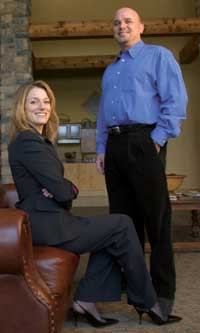These strategic deals, which began three years ago, mark a turning point in the company’s 12-year history. “The decision we made as a company to expand and to grow would not have been possible without forming strategic relationships,” Potashnik says. “There would be a limited amount of business that we could do if it were 100 percent Southwest Housing, Brian-and-Cheryl-Potashnik-owned-and-operated.”
In 2001, Southwest joined forces with the Austin Housing Finance Corp. to develop Primrose at Shadow Creek, a 176-unit affordable housing community in Austin, Texas. Desperate to build a new affordable senior community, the finance corporation sought out a developer with high standards, a long-term investment strategy, and a sound recommendation from the equity partners, says Paul Hilgers, director of neighborhood housing for the city of Austin.
The corporation met Southwest, and “the closer we got, the better we liked them,” says Hilgers. “Brian is very passionate about what he does, and he’s got the nerve and the courage to stand up to opposition in some places in Texas that are really opposed to [affordable housing].”
Based on the success of projects like Primrose at Shadow Creek, all 10 of Southwest’s projects slated for 2005 are partnerships with housing authorities or finance corporations. “I think it’s really the future of affordable housing,” says Potashnik.
Life Changes But Southwest Housing’s commitment to affordable housing extends well beyond bricks and mortar. “The company really focuses on the resident to a degree that we don’t typically see in the development community,” says Wright of Newman and Associates. “They offer social services that really go above and beyond what is required of them, and by doing that, they’ve been able to retain a lot of their residents in markets that are seeing a lot of turnover.”
Southwest Housing offers its residents a wide range of free services run by Housing Services, a Dallas-based nonprofit service provider. In addition to the typical family services like after-school programs and adult education classes, two years ago Southwest implemented individual development accounts. The company matches residents’ savings for a down payment on a home or continuing education. On the senior side, services range from prescription and spiritual wellness programs to financial assistance and benefits counseling. To fund these services, Southwest leverages its own resources with those of public and private institutions, like government agencies and corporate donors.
“People tell us the main thing that differentiates us from the competitors is [that] lots of people talk about doing these programs, but we actually do them,” says Cheryl, who says the social services side of Southwest’s business can be quite rewarding. During a recent dinner out, the restaurant’s manager approached the Potashniks. “You probably don’t recognize me,” he said, “but thank you for not only housing my family and me when we came to the country 10 years ago, but for helping us adjust to life in America.”
“That was really neat,” Potashnik recalls. “Those are the things you can’t put a price on.”
Social services not only play a critical role in helping to better the lives of Southwest residents, but the activities and programs help properties stay in good condition by keeping residents busy and out of trouble, Potashnik says. Properties also are maintained through strict community policies. At a Southwest Housing property, all children must be enrolled in school, and adult residents must either attend school or work 30 hours a week. Security is tight, with additional help of city police in tougher neighborhoods. Properties are inspected regularly.
“We’re very active in terms of site inspections—we do [them] personally on the properties,” says Cheryl. “We have a very high standard on how the properties need to be maintained.”
